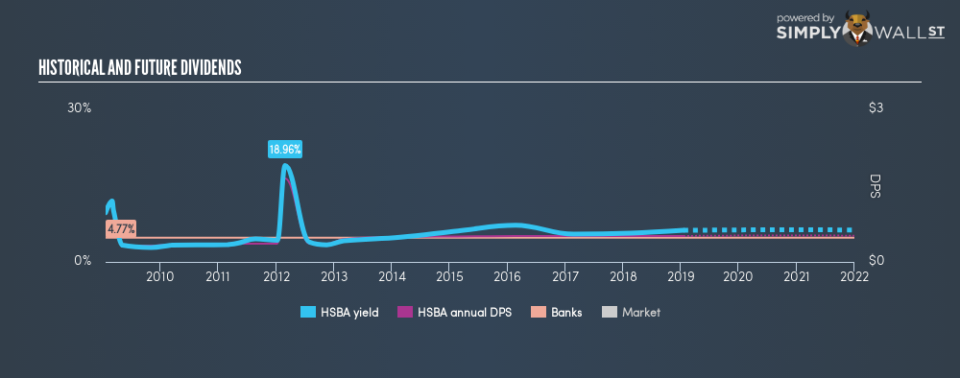Is HSBC Holdings plc (LON:HSBA) A Smart Pick For Income Investors?

A sizeable part of portfolio returns can be produced by dividend stocks due to their contribution to compounding returns in the long run. Historically, HSBC Holdings plc (LON:HSBA) has been paying a dividend to shareholders. Today it yields 6.2%. Should it have a place in your portfolio? Let’s take a look at HSBC Holdings in more detail.
View our latest analysis for HSBC Holdings
Want to help shape the future of investing tools and platforms? Take the survey and be part of one of the most advanced studies of stock market investors to date.
How I analyze a dividend stock
When researching a dividend stock, I always follow the following screening criteria:
Is their annual yield among the top 25% of dividend payers?
Has its dividend been stable over the past (i.e. no missed payments or significant payout cuts)?
Has dividend per share risen in the past couple of years?
Does earnings amply cover its dividend payments?
Will it have the ability to keep paying its dividends going forward?
Does HSBC Holdings pass our checks?
The company currently pays out 94% of its earnings as a dividend, according to its trailing twelve-month data, meaning the dividend is not sufficiently covered by its earnings. In the near future, analysts are predicting a more sensible payout ratio of 67%, which, assuming the share price stays the same, leads to a dividend yield of 6.3%. In addition to this, EPS should increase to $0.72, meaning that the lower payout ratio does not necessarily implicate a lower dividend payment.
When assessing the forecast sustainability of a dividend it is also worth considering the cash flow of the business. Cash flow is important because companies with strong cash flow can usually sustain higher payout ratios.
If there is one thing that you want to be reliable in your life, it’s dividend stocks and their constant income stream. Not only have dividend payouts from HSBC Holdings fallen over the past 10 years, it has also been highly volatile during this time, with drops of over 25% in some years. This means that dividend hunters should probably steer clear of the stock, at least for now until the track record improves.
Compared to its peers, HSBC Holdings produces a yield of 6.2%, which is high for Banks stocks.
Next Steps:
Whilst there are few things you may like about HSBC Holdings from a dividend stock perspective, the truth is that overall it probably is not the best choice for a dividend investor. However, if you are not strictly just a dividend investor, the stock could still offer some interesting investment opportunities. Given that this is purely a dividend analysis, I recommend taking sufficient time to understand its core business and determine whether the company and its investment properties suit your overall goals. There are three relevant factors you should look at:
Future Outlook: What are well-informed industry analysts predicting for HSBA’s future growth? Take a look at our free research report of analyst consensus for HSBA’s outlook.
Valuation: What is HSBA worth today? Even if the stock is a cash cow, it’s not worth an infinite price. The intrinsic value infographic in our free research report helps visualize whether HSBA is currently mispriced by the market.
Dividend Rockstars: Are there better dividend payers with stronger fundamentals out there? Check out our free list of these great stocks here.
To help readers see past the short term volatility of the financial market, we aim to bring you a long-term focused research analysis purely driven by fundamental data. Note that our analysis does not factor in the latest price-sensitive company announcements.
The author is an independent contributor and at the time of publication had no position in the stocks mentioned. For errors that warrant correction please contact the editor at editorial-team@simplywallst.com.

